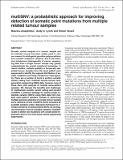multiSNV : a probabilistic approach for improving detection of somatic point mutations from multiple related tumour samples
Abstract
Somatic variant analysis of a tumour sample and its matched normal has been widely used in cancer research to distinguish germline polymorphisms from somatic mutations. However, due to the extensive intratumour heterogeneity of cancer, sequencing data from a single tumour sample may greatly underestimate the overall mutational landscape. In recent studies, multiple spatially or temporally separated tumour samples from the same patient were sequenced to identify the regional distribution of somatic mutations and study intratumour heterogeneity. There are a number of tools to perform somatic variant calling from matched tumour-normal next-generation sequencing (NGS) data; however none of these allow joint analysis of multiple same-patient samples. We discuss the benefits and challenges of multisample somatic variant calling and present multiSNV, a software package for calling single nucleotide variants (SNVs) using NGS data from multiple same-patient samples. Instead of performing multiple pairwise analyses of a single tumour sample and a matched normal, multiSNV jointly considers all available samples under a Bayesian framework to increase sensitivity of calling shared SNVs. By leveraging information from all available samples, multiSNV is able to detect rare mutations with variant allele frequencies down to 3% from whole-exome sequencing experiments.
Citation
Josephidou , M , Lynch , A G & Tavaré , S 2015 , ' multiSNV : a probabilistic approach for improving detection of somatic point mutations from multiple related tumour samples ' , Nucleic Acids Research , vol. 43 , no. 9 , e61 . https://doi.org/10.1093/nar/gkv135
Publication
Nucleic Acids Research
Status
Peer reviewed
ISSN
0305-1048Type
Journal article
Description
Funding: Cancer Research UK grant C14303/A17197. Funding for open access charge: University of Cambridge.Collections
Items in the St Andrews Research Repository are protected by copyright, with all rights reserved, unless otherwise indicated.

